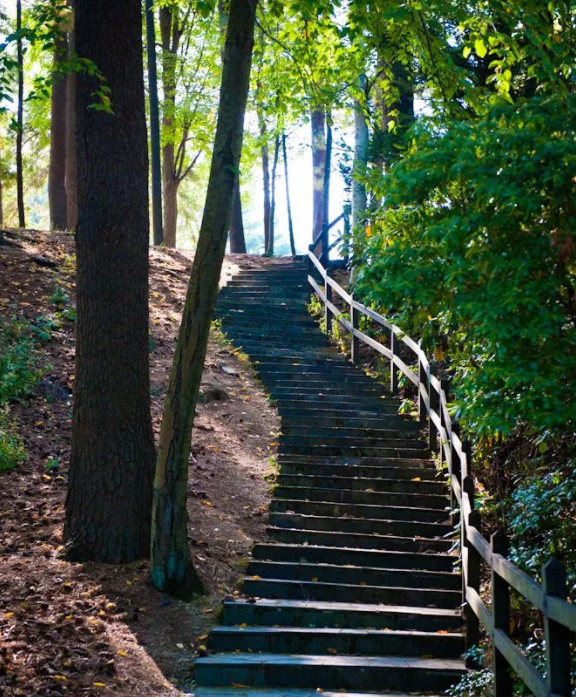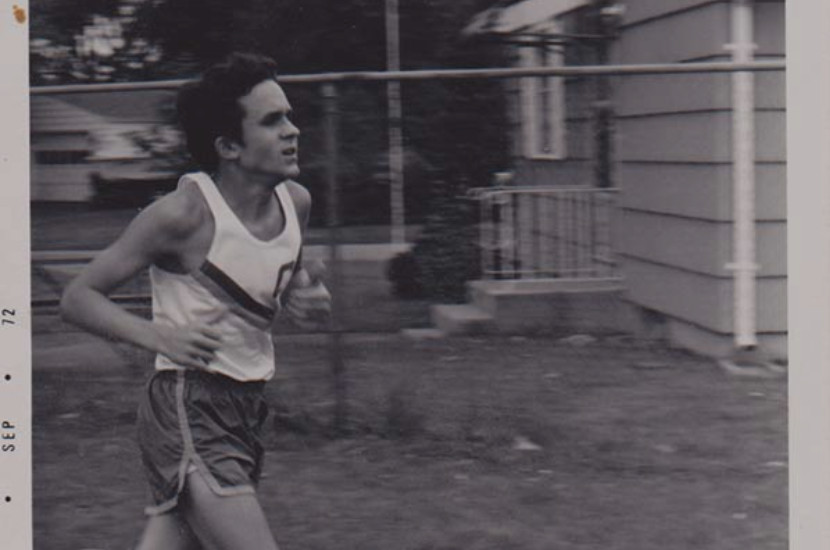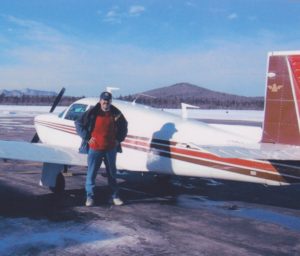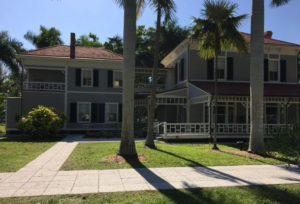As I turned our car right to leave Stanley Park in Westfield, Massachusetts, recently, that most precious type of memory sprang to mind. The memory hadn’t surfaced for nearly half a century, and it burst forth so suddenly and dramatically I momentarily forgot I was driving a car. I was lost in a vivid recollection of an epic road race I ran in that very park back in 1972. What mattered wasn’t the race itself or the outcome. Instead, it was the decision, for the first time in my 17 years, to drop the indifference of adolescence, look beyond the challenges of family life, push myself despite seemingly insurmountable odds … and prevail.
My wife, Elisa, and I were in Westfield for a Saturday afternoon lunch and visit with our oldest son Dan and partner Annie. Separated by pandemic restrictions, we hadn’t seen each other for seven months. We chose Westfield since it was located halfway between our homes. The visit was long overdue, and it was a joyous one. We ate lunch in the outside dining area of a downtown Westfield pub before heading to Stanley Park to stroll through the woods. We caught up on each other’s lives for over four hours before heading back to our cars. Then, Elisa and I headed west back to the Saratoga, New York, region. Dan and Annie drove east back to Boston.
I backed our car out of a parking space and headed toward the park exit, where I turned onto Western Avenue to work our way back to the Massachusetts Turnpike. I gazed at the campus of Westfield State University to our left, casually glanced back at the park on our right, and for a few moments I was no longer in the car. I’d gone back in time to 48 years ago.
The scene was exactly the same: rows of trees on both sides of the asphalt sidewalk. equally spaced on short-cropped grass. A low wall of slate tiles. An afternoon sun casting shadows from the utility poles and lines across the street. I returned to the present after a few minutes, but I thought about that day all the way home. And for days and weeks afterward.

***
I was a junior at Chicopee Comprehensive High School. I was a rail-thin, shy, introverted kid who was more concerned with deciphering the meaning of “2001: A Space Odyssey” than with making friends or earning good grades. A group of classmates convinced me to try out for the cross-country team to help get me away from science fiction books and pave the way for actual friendships. My family opposed the idea, but after a long battle over the summer my parents granted tentative approval for me to try out. I think they thought I wouldn’t make it. With some coaching from a few classmates who were long-distance runners I trained over the summer. I found that my thin frame was well-suited to the standard 3-mile races run in interscholastic cross-country in Massachusetts. I made the seven-man varsity squad. The last student to qualify, I was given a team jersey and shorts and proudly wore them home.
As the fall season unfolded in 1972, we were a high-flying squad. We easily won most of our meets. Our team was a mix of personalities, and amazing long-distance runners. There was the friendly, white-haired Jimmy Ashe, who lived with his family next door to our high school. He was our top runner. He was also a mentor of sorts to me. When I struggled to improve my times, Jimmy would talk to me in the locker room, smile, and say he was convinced I could keep up with the other varsity runners. There were the two Dillon brothers who, like me, had lived in various places around the world because their father was in the Air Force. Both were fast. One, Dan, went on to a successful collegiate career and competed in marathons. His brother Jim, bigger and quicker to smile, was a little less serious but a very talented athlete. The Dillons and I ran together a lot over the summer as we prepared for the 1972 fall season. I have long since forgotten my other three teamates. I just remember I was always the last guy on our team to cross the finish line. Sometimes I beat one or two runners on the opposing team’s seven-man squad. Other times I’d huff and puff and finish fourteenth. Still I loved the sport and began reading tales like “The Loneliness of the Long-Distance Runner.” That 1959 short story dealt with a young man who escaped his terrible life by running. My life wasn’t that terrible, but I identified with the writer.
As our yellow school bus pulled into the parking lot of Stanley Park for our race against Westfield High School that October weekday, we knew we had another win in the bag. Westfield was having a tough season, and most of their runners turned in times that didn’t come close to ours. As we limbered up next to the starting point, our coach, Alex Vyce, told us not to take anything for granted. He wanted fast times to prepare for regional and state tourneys later that fall.


Our seven lined up with Westfield’s seven competitors at the starting line. An official raised a gun, called “set,” and fired, dispatching 14 high school athletes onto a 3-mile race through the woods and back along Western Avenue before a final right turn into the park and the finish line.
My teammates quickly dashed into the lead. I tried to keep up. Within a half-mile, all of us were well ahead of the opposition. Soon, I lost track of my faster teammates but I remained in front of Westfield’s runners. I settled in at my usual pace of about 17 minutes for 3 miles. I began thinking that we might accomplish the cross-country team’s version of a complete shutout: all our runners finishing before everyone on the other team. It was a rare feat. I knew if I let someone on the other team finish before me, I’d be in for a good deal of razzing from my teammates on the way home.
About 2.5 miles into the race, just after leaving the woods and turning onto the Western Avenue sidewalk for the homestretch, I started to ease up. No sense wasting more energy than I needed to, I thought. I passed houses to my right before approaching the final stretch. My confidence soared.
That’s when IT happened. For months and well into college I’d remember those next few moments as a pivotal point in my life. Out of the corner of my left eye I spotted a bouncing shadow keeping pace with me. It could only mean one thing: The late-afternoon sun was alerting me that Westfield’s top runner was closing in. Fast. A few seconds later I could hear his heavy breathing and the “clop-clop” of his running shoes hitting the sidewalk. The size of his shadow grew. I had reserves left so I sped up and turned my gaze straight ahead. I checked back for the shadow a few seconds later. It was larger! His breathing was louder. I could hear the swish of his shorts against his legs. A wave of fear swept through me. I couldn’t let the Westfield runner pass me. I summoned more reserves and ran faster. Ahead, about a quarter mile away, I could see our final turn to the finish line.
My opponent fell back a little, and I began to feel better. Seconds later my hopes were dashed as he closed in on me again. I had no reserves left. It seemed like he was so close his shadow was blending with mine. He started to pass me. I leaned forward and struggled to stay in front. My breathing was labored. I was thirsty. Sweat poured into my eyes, making them sting. His shadow fell back a little. Seconds later he was right back with me. I began to panic. I pumped my arms in a desperate effort to stimulate the rest of my body, especially my legs. They began to suffer under the stress, and my muscles cramped.
The scene kept repeating itself for what felt like 10 minutes. This drama probably took only about one, maybe two minutes.
Assessing my physical state, I checked back for the shadow one last time. It was still there. The situation felt hopeless. I was making giant, hoarse noises when I inhaled. I had no physical energy left. I now doubted I could even finish the last eighth of a mile. Then came the turning point. I began arguing with myself. The contest became a mental one. I had absolutely nothing to lose by scratching, clawing for any ounce of energy I could find, even if it meant tearing muscles, ligaments, or tendons. I would happily accept a ride in the ambulance to nearby Noble Hospital and months of recovery rather than giving up. To this day I don’t know how I did it, but it was the first time in my life that I reached deep into my body to summon adrenalin. I pleaded with my heart, my muscles, my bones for something … anything that could keep me ahead of Westfield’s lead runner. I experienced something I had never felt. My entire body began to tingle. Waves of renewed energy swept into my legs and my lungs. I realized I had been hunching over. I now ran erect and sprinted forward as though my life depended on it. I risked one more glance left. The shadow was growing smaller. I was pulling ahead.
My exhaustion evaporated, I felt like I could run 10 more miles. I made the last right turn into Stanley Park. My teammates and coach were screaming. They had given up hope for a shutout until they saw me. I didn’t know it then but the reason I didn’t see the other runner’s shadow any more was because we had changed directions. I could no longer see the shadow of anything behind me. That runner, my team yelled, was closing in on me. I gave it my all and made one last sprint, crossing the finish line 2 seconds before him. I tried to shout but had no wind. My teammates were clapping me on the back. I fell to the ground and tried to catch my breath.
The other Westfield runners began crossing the finish line a few minutes later. I stood back up and walked over to my opponent. He was bent over, breathing hard. I reached out with my right hand. He looked up at me. We shook hands. I mumbled something like, “Nice race.” He said nothing. I never even got his name. He walked back toward his team, slowly.
I don’t remember much else about the day. I was quiet on the bus ride back to Chicopee. When someone asked how I felt I said something stupid like, “I guess I proved I’m better than all the runners in Westfield.” Some teammates laughed. They said that might be true for high school, but there was a bevy of runners at nearby Westfield State College and elsewhere in that city who’d leave me in their dust. I nodded agreement and went back to being quiet.
It took a few more weeks for me to digest what happened that day. Our team celebrated the rare clean sweep. I began to reflect on what the race meant, and it had nothing to do with running. For the first time in my life I had proactively decided against giving up when faced with adversity. I thought of a physics principle I had learned in a science class that year: Electricity and water generally take the path of least resistance. Until that day in Westfield that path had been my choice when faced with a challenge, whether it was a difficult exam or my desire to talk to a cute girl. I’d settle for a 70 on a test rather than invest hours poring over a textbook or the few notes I took in class. I’d walk by the girl in the hallway, saying nothing. Whatever the easier road, I took it.
But the Westfield race changed things forever. It represented that most precious of personal assets: I had proved to myself I could overcome an obstacle, without someone else showing me the way. I would no longer have to accept the status quo. I had a template to draw on in the coming years. I would use it over and over as I struggled to get into college and earn a degree. I would use it at the dawn of my professional life first as a newspaper reporter and then as a mid- to upper-level manager in a large corporation. The memory of the race itself faded rather quickly but its lesson never left me.
***
The sun was slipping below the hills ahead of us as Elisa and I sped along the Massachusetts Turnpike west into the Berkshires on the way home. I continued to replay the race in my head. I decided I needed to write it down.
As we neared home, I was left with one question that may remain unanswered: What happened to the runner who pressed me so hard that day? He probably never knew he pushed me beyond my physical and emotional limits and changed my life forever. I’d like to thank him.
###



